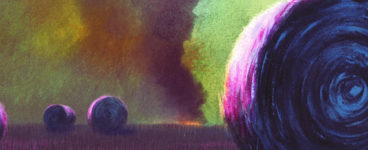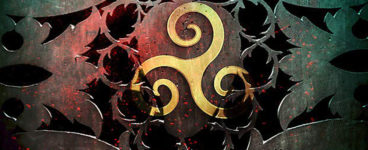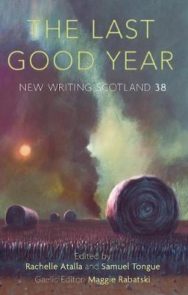‘Our bones hold the nuclear tests in New Mexico, and so do wine cellars, trees and soil,’
Each year the Association for Scottish Literary Studies publishes their New Writing Scotland anthology. Here, we share two poems from the anthology, which includes work from from forty authors – some award-winning and internationally renowned, and some just beginning their careers.
Poems taken from The Last Good Year: New Writing Scotland 38
Edited by Rachelle Atalla, Samuel Tongue and Maggie Rabatski
Published by the ASLS
GARDENER
Susan Mansfield
That’s how I see my father, looking back,
always stooped with a spade in his hand
slicing square sections from the rich, dark earth,
the rhythm of it, the heft of each cut,
leaving it furrowed and fresh, full of promise,
the mica gleam of it, ready for growing,
ready for roots. For the magic of growing
happens deep down where the land gives back
the lifeblood to the seedling, promising
fragile new things which need tended by hand,
and some will wither, such is the cut
and thrust, the mixed blessings of the earth.
My father claimed as his this patch of earth,
set aside plenty of ground for growing,
how he paced it out, how the sod was cut
without ceremony, how he bent his back
to building a home with his own hands,
with enough room in case the promise
in her eyes became more than a promise
and tending his seedlings in the dark earth
was just the beginning. How one small hand
changes all you know about growing,
the unflinching force of it, no looking back,
eyes on the wide horizon ready to cut
and run, but all so soon, the toughest cut
for man or gardener, seeing a promise
fulfilled by leaving you, then going back
to lay down next year’s crop in the mulched earth
and wait for the consolation of growing
while the furrows deepen on your gnarled hands.
I wasn’t even there to take his hand
at the last, which is the strangest cut,
holding the phone in the half-light, the growing
sense that the things we think are promises
are only good intentions, and the earth
receives everything but gives nothing back.
Now, the weeds grow thicker and in my hand
no spade to cut them. I made no promises,
feeling the turn of the earth at my back.
BLAST ZONE
Lotte Mitchell Reford
I want to write about meaningful things
but everything coming out is about fucking
or sometimes about churches. Often about how
I’m worried about drinking myself stupid
or to death. There is a story I’ve been wanting to tell
about the time I broke my leg and the morphine barely
worked,
how a man who loved me held my calf for an hour and felt
the split bones
pressing into his palms, and also a scene stuck bouncing
round my brain,
something I heard in an interview on NPR about nuclear
tests
in the ’50s and how they made young men bear witness to
the devastation
and gave them questionnaires afterwards to gauge its effect
on their mental health. Was it like a psychiatric intake form?
‘In the last week, on a scale of 1–7, how often have you
thought
about death’ – this one is always a 7 – or more like the
pain charts
they give you in an ambulance. Those ones have faces
to represent 0, 1–3, 4–6, 7–10. The only time I have pointed
at one of those little faces I had to ask what I was comparing
my current pain to. I’ve never felt anything worse than this
I said, my left tibia and fibula smashed into several pieces,
But someone must hurt more? Like, where are those men
now,
who after they watched the blast from a trench at a distance,
walked out in a line,
a search party, and combed the desert for what was left.
Those bombs are used now to measure everything
temporally. There is a before and an after; for bones, for
wine.
And in the middle of that hard dark line across time
were animals penned in the blast zone. The furthest out
lost limbs
and survived a while. Most of the animals were pigs
because pigs die like humans, and the guy I heard
on NPR, he said the worst part was how delicious
the whole desert smelled, a giant barbecue,
and that as they are dying like humans, pigs scream like
us too,
and yet, still, he thought of food. While we waited
for the ambulance Thom and I talked about pizza to
distract me,
pretending I’d be home in time for dinner.
In the hospital they pulled on my foot to reset the bones
above.
They told me not to worry because pain
is something we never really remember and anyway
I’d had all the morphine they could give me. I didn’t want
to point out
there are many kinds of pain, and some are hard to forget
some remain etched into you, your body and bones
or become a new kind of glass, Trinitite, superheated sand
which registers as radioactive. I didn’t want to tell them
that I had a hefty tolerance for opioids.
I never want to tell people who fix bodies
about the things I do to mine. Most of those men,
young as they were, must be dead now. Our bones hold
the nuclear tests in New Mexico, and so do wine cellars,
trees
and soil, but how do we hold those boys
with us too, how do we keep bearing witness,
how do we remember to remember?
The Last Good Year: New Writing Scotland 38, edited by Rachelle Atalla, Samuel Tongue and Maggie Rabatski is published by the ASLS, priced £9.95.
ALSO IN THIS ISSUE

 The Last Good Year
The Last Good Year
‘Our bones hold the nuclear tests in New Mexico, and so do wine cellars, trees and soil,’

 The Book According to… Craig Russell
The Book According to… Craig Russell
‘I think every writer explores the complexities, paradoxes and contradictions of their own cultural …













